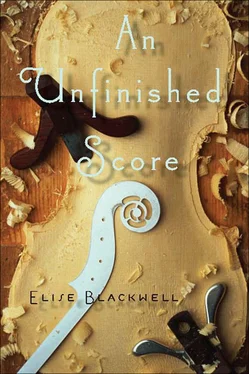It is as Suzanne suspected: Ben has always known his father’s death was a suicide.
“I knew but I didn’t always know, if that makes sense.” He looks at her when he talks, and this, in its unfamiliarity, is as disarming as anything. “Sometimes I let myself believe my mother’s version of events, though of course I always really knew.”
“Why didn’t you tell me?” She cannot stop herself from asking.
He shrugs, then holds his head in his hands, elbows propped on his knees as they sit side by side on the porch steps. “I didn’t want you to think I was genetically predisposed to be weak or crazy. I thought you’d be afraid of the Schumann biography and run from me. I thought you might be afraid to have children with me.”
“You’re the one who stopped that.”
He sits quiet for a moment. “Maybe my wanting to wait did have something to do with my father. I don’t know.”
Suzanne pauses, biting into her lip, crying now. “I’m really sorry about your father. And Charlie. I loved Charlie. And I know I should be better than this, but I don’t understand why you let me believe I wasn’t good enough for your family. And why you didn’t tell me.”
This is, she thinks, the most honest conversation they’ve ever had.
“Suzanne,” he says, disbelief shading his voice, “I have never thought I was better than you, ever. I’ve admired you from the beginning. I’ve always felt like you saved me by marrying me. I would be lost without you; don’t you know that?”
She shakes her head, her mind yelling, No, no, no . She has no idea whether he is lying now or misinterpreting the week’s emotion, or whether she’s misunderstood all along.
Finally they lean into each other, shoulder to shoulder, still in the thick summer air, in a neighborhood quiet with night except for the orchestra of insect life, the occasional car sweeping down the 206, the electric buzz of the streetlight as it struggles to life.
After a long time Ben puts his arm around her shoulders, pulls her weight into him. “I always wanted to tell you about my father. It was never that I didn’t trust you. I just — I just could never say it.”
Suzanne has been supporting some of her own weight; now she lets the tension holding her spine drain and collapses into Ben, breathing in his smell.
They can start over, she thinks. They can still have everything, get everything right, even if they cannot undo what they’ve already done. In this moment she wants to wind back all the world’s clocks, send its calendars fluttering in reverse. Where she would stop them, she isn’t sure, but it might be that first day she saw Ben, who was wrapped over his cello and looked at her with mournful eyes, all his sadness there for her to see if only she’d really looked.
Intermission is over, and they are playing the Black Angels Quartet . All four musicians know it: they are playing extremely well, so well that the music holds them and not the other way around. The nearly full auditorium belongs to them, to the piece. They possess the audience. The air itself vibrates, electric with the loud music.
Anthony and Petra make their violins scream, sawing away during the section that represents insects swarming the Vietnamese jungle. Daniel plays with his eyes closed, his outsized score but a stage prop. His gestures are large and loud — music on high volume even for the hard of hearing. Suzanne’s heart beats wild and hard in her chest, and sweat drizzles down the back of her neck, between her breasts, along her slick waist. But her hands are steady even as the veins running down her forearms buzz. At the end she gasps audibly; they all do.
The applause falls hard, breaks into the exuberant. Suzanne sets her bow on her lap and pulls sweat-matted hair back from her forehead and temples. She is grinning. Petra is grinning, and Daniel, too. Anthony stands, bows, extends his right forearm for them to follow suit, which they do. Before she takes her bow, Suzanne looks up to the facets of the concave ceiling, the design that allows their music to find its ears at just the right angles. The manic pride and relief she feels remind her of that night in St. Louis, the night she played Harold in Italy , and Alex’s absence stabs her.
She wishes he had heard her play tonight, that he was watching now, that his hands contributed to the applause that continues. She closes her eyes and listens to that clapping, trying to discern particular people from the group of mostly strangers. Friends pepper the audience, and surely other people she sees around town. Ben is out there, she knows, with Adele and maybe, just possibly, her father. No, not her father. And not Alex . Suzanne opens her eyes and the applause again becomes communal, an audience clapping in unison. She searches for Ben and spies him in an aisle seat halfway back, looking right at her, his hands clasped but now still.
Jennifer has planned an extraordinary party at her parents’ stately Nassau Drive home. The sign-in sheet will be a glorified order form designed to secure advance sales of the CD before enthusiasm wanes and forgetting begins. It’s not long after the final curtain call that Anthony assures them the recording was a technical success and tells them about the guest book.
But that’s the only tacky aspect of the party. Everything else speaks class, from the good chocolates to the excellent pianist sliding lightly across Debussy and Chopin. Suzanne and Petra enter together, still in their black dresses, though Suzanne has brushed her sweaty hair and spun it into a chignon.
“Nice house,” Petra says, “but the people are going to be really annoying, aren’t they? Anthony told me I have to be on my best behavior, no fun at all.”
“Who was that pianist?” Suzanne asks. “He was hired to play at a party for the Vanderbilts or some family like that? And Mrs. Vanderbilt offered him a thousand dollars and told him that he was not, under any circumstance, to mingle with the guests.”
“Yeah.” Petra nods. “So did he tell her to go to hell?”
“He told her, ‘In that case, madam, you only have to pay me five hundred.’”
“That’s actually funny,” Petra says, dropping her arm around Suzanne’s shoulders as they move in and around the large downstairs rooms, which have been cleared of their usual furniture and set up for the party.
After she and Petra separate, Suzanne drinks a glass of champagne. She eats crab puffs and strawberries dipped in chocolate. She talks to small groups of people: Elizabeth and some of her friends, Jennifer’s parents, Anthony and a man who teaches at the Institute for Advanced Studies, people she does not know, Daniel and Linda.
“It’s soda water,” Daniel says, lifting his drink. “Proof positive that love changes people.”
“You guys are sickeningly sweet, and you look irritatingly good together,” Suzanne says. “I’m very happy for you.”
Linda continues looking up at Daniel’s face as she speaks to Suzanne. “I can’t believe I found him. What are the chances?”
It is just beginning to feel late when Suzanne steps into a conversation boiling over between Petra and Jennifer, who beckons her to join something she would prefer to avoid.
Jennifer wears what Petra calls “a big black dress” with a double strand of pearls. As Suzanne steps close enough to make the conversation a triangle, Jennifer is saying, “When someone cheats, they’re not just cheating on their spouse. They’re cheating on their children.”
“You’re so American.” Petra’s voice is sloppy and sharp all at once.
“If by ‘American’ you mean I know the different between right and wrong, then yes. Guilty as charged.”
Читать дальше












